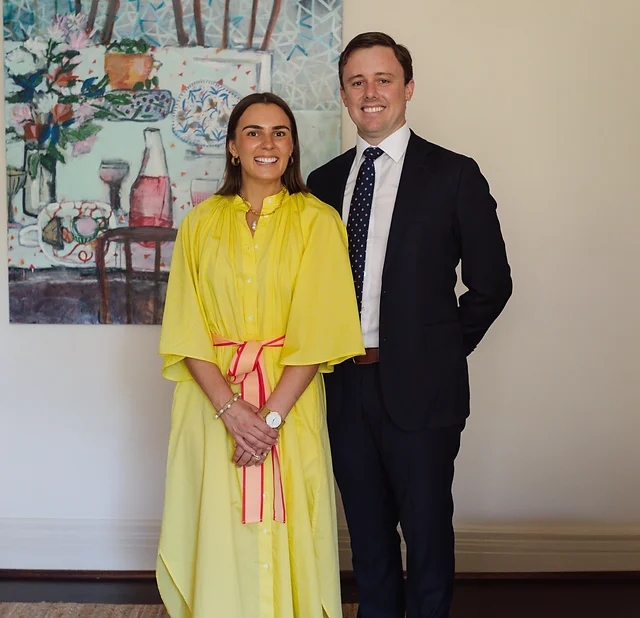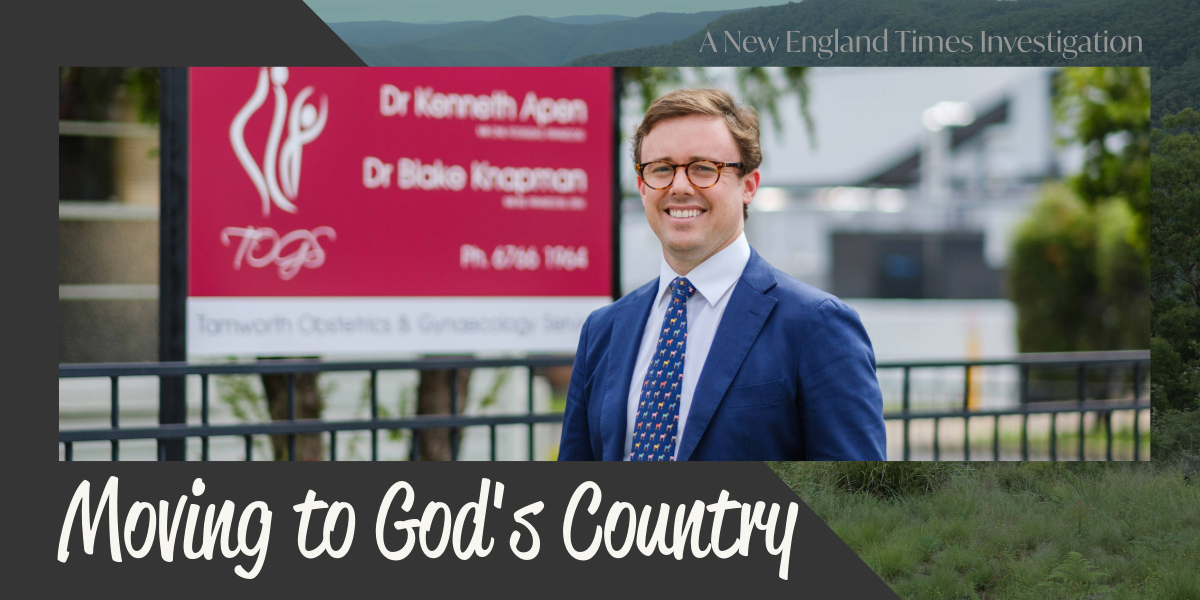Tamworth’s Dr Blake Knapman apologises that he may be interrupted.
Interruptions are common in his line of work, as any mum can tell you, babies come when they want to, and they don’t care about prior appointments.
Growing up on a mixed farming operation at Gunnedah, the highly skilled obstetrician, gynaecologist, and laparoscopic surgeon, is very much a local, and happy to have been able to return home after two decades away.
“My family have been farming in the area for 100 odd years. So very much home. So glad to be home.”
A definite plan to bring expertise home
Dr Knapman says it was always part of the plan to move home at some point.
“I think it was always the plan, and, certainly, for the last five-plus years, it was a very definite plan.”
“The reason that we stayed in Sydney as long as we did was really just training.”
“It was very important to me that when I came regionally, that I had maximised my opportunities in terms of training in Sydney, and also that I had a really strong network of clinicians in Sydney that I could refer complex patients to and also just bounce off. So I’ve been very fortunate in that.”
Dr Knapman was working and training at the pinnacle of women’s health in Australia, The Royal Hospital for Women in Randwick.
“I worked at the Royal for just shy of a decade and did all of my training there. That’s actually where I met my wife, at the Women’s.”

Jess Knapman is an equally highly trained midwife with extensive experience in the perinatal management of high-risk pregnancies. She is also from a local farming family, and has also brought her expertise home to the benefit of expectant mothers in the region.
And it is the expertise we desperately need. According to a parliamentary committee report, there are dire staff shortages across rural maternity care. While most mothers can birth without the need for specialist care, the generally tight constraints around health care resources in our region means the likelihood of expectant mothers being transferred to Tamworth – or beyond – if there are complications is high.
‘All-risk’ approach providing mums with options
Dr Knapman’s extensive training means he can look after high-risk patients here in Tamworth, rather than having to send them away to bigger hospitals. But he is happy to care for low-risk patients too. He describes it as caring for ‘all-risk’ patients.
“I think that there’s this feeling that doctors only do high risk pregnancies. The midwifery space really has taken over a lot of the low risk stuff, which is extremely appropriate.”
“But I suppose when people are wanting private care, it’s kind of making it very clear to them that you don’t need to be complex for me to be interested in caring for you.”
“Private obstetrics is another example of a continuity of care model, and we know that continuity of care, regardless of who is the care provider, means better outcomes for women,” he said.
“I’m interested in everyone, not just high risk people, but also making the high risk patients feel comfortable that I have the skills and training to deal with complexities.”
“There’s limitations on what can be done locally and particularly in terms of prematurity, but in terms of managing the pregnancy, it was kind of making them aware and comfortable that they would be well cared for.”
Rapid growth of practice a privilege
He praised the service provided in Tamworth as being very robust, describing it as “a good service by any standard”, and very supportive of him as the new doctor in town.
“We’re very lucky in Tamworth as there’s four gynaecologists that work privately, including myself, all of whom are very skilled.”
“Regional women need access to care and high quality care, and the outlying towns in particular, there’s lots of travel for those patients. Because, really, Tamworth is the only place that has that level of care.”
Dr Knapman says he has found the huge demand for his services locally fantastic, rewarding, and not overwhelming.
“No one wants to start their professional life twiddling their thumbs, waiting to see patients.
“To be in a situation where things do build infinitely quicker than in Sydney, where people just have so much choice in terms of their care provider, is really a privilege.”
“So I’m never going to be complaining about being too busy, because I think, you know, that’s a privilege that patients are choosing to see you.”
“So I found that transition to be actually really rewarding and satisfying. I like that people seem interested in coming to see you.”
Dr Knapman says it has been a 20-year journey to get to where he is now in terms of skill, and moving to Tamworth means he is well ahead of his Sydney colleagues as it has allowed him to make the transition from the Women’s to private practice without losing the constant hands-on practice of medicine.
“No doctor wants to get to this point and feel like your skills are slowly wearing off because you’re not practising them in the time it takes to build up enough work,” he said.
“So, I found that to be fantastic. Doctors do not want to be idle.”
Family thrives with space to move
On a personal level, Dr Knapman and his wife Jess, as well as their two-year-old daughter, have found the move to be very positive. And, as they’re expecting again, it is a pleasant relief to have some space.
“Just in terms of lifestyle, this has been the best decision for our family.”
“Going from living in a one-and-a-half bedroom apartment to having a home with a backyard has just been an absolute game-changer, and it’s just so pleasant to see our little girl flourish in that environment.”
“We both grew up on farms, so living in a house in town is still not our childhood, but it’s certainly much closer than it was in the eastern suburbs, and that’s been a really pleasant thing to watch.”
There were some expected challenges, as there are with any move, but they planned ahead to secure a home and child care before moving day.
“The nicest thing about coming home is really just being close to our families,” Dr Knapman said.
“We were both in Sydney for about 20 years, so being back near our families and watching them having a much closer interaction with our daughter has just been so rewarding, and having their support while we’re building a business and settling into a new working environment and social environment has been invaluable. We’re very fortunate.”
Don’t wait to make the move
Dr Knapman has some straight forward advice for those considering a move to the New England.
“Do it now. Don’t wait,” he said.
“The New England is very fortunate in terms of what it has to offer, it really has lifestyle advantages far beyond those of Sydney.
“I speak to my friends regularly, especially my doctor friends, about it, about coming out here and giving it a go, because there is a really great community.”
“I think the most important thing of all is having community… people just wrap around you, and that does not happen in Sydney,” he said.
Dr Knapman says he hopes the many advantages to living regionally and the way that our region has matured will encourage more like him to come home.
“When I was a kid, growing up here, you really did feel like there wasn’t much going on. But certainly now, coming back as an adult, the region really has so much to offer, not just professionally, but socially.”
“There’s fantastic places to eat and drink, and the town has really changed in that respect, and I think that’s a great thing for young people, and will hopefully attract more young people home.”
“I cannot speak highly enough of the move. It is the decision of our lives. It is absolutely a pleasure to be home.”
Top image: Dr Blake Knapman outside his clinic in Tamworth (Antony Hands; New England Times)
Our series on people who have moved to the New England is supported by a micro-grant from the Local Independent News Association (LINA) and the Walkley Meta Fund Grant that has enabled New England Times to have an investigative unit.


